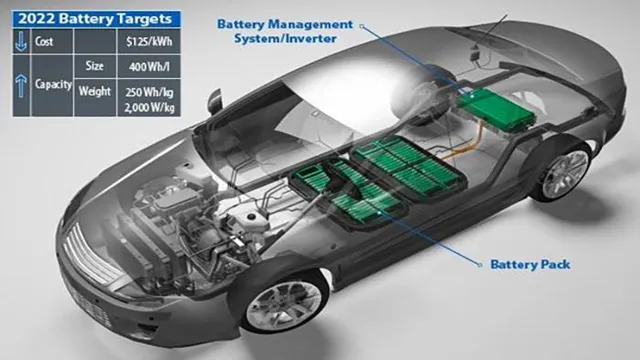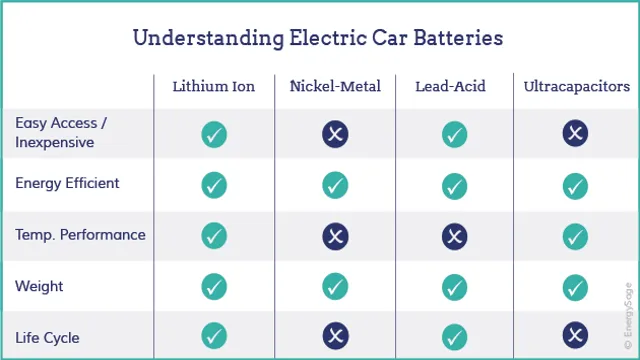electric-car-battery-weight-in-pounds
Electric cars are quickly becoming a popular choice among eco-conscious consumers who want to reduce their carbon footprint. While these vehicles offer a range of benefits, one of the most significant drawbacks is the weight of their batteries. So, how heavy are electric car batteries, and what impact does this have on the car’s performance? Let’s take a closer look at the electric car battery weight in pounds and how it affects the overall driving experience.
When you think of a car battery, the first thing that probably comes to mind is a small, rectangular block that fits under the hood. But electric car batteries are a different story. They’re much larger and heavier than traditional car batteries, weighing in at several hundred pounds.
This added weight can have a significant impact on the car’s acceleration, handling, and overall performance. For example, a Tesla Model S can weigh anywhere between 4,000 and 4,900 pounds, depending on the battery pack it comes with. The battery alone can weigh up to 1,200 pounds, which is roughly equivalent to the weight of a standard compact car.
This additional weight can affect the car’s range, acceleration, and handling. Despite the added weight, electric cars still offer many benefits over traditional gas-powered vehicles. They produce zero emissions, which is better for the environment, and they save drivers money on fuel costs.
Additionally, newer electric car models are being designed with lighter materials, which can help reduce the weight of the battery and improve the car’s overall performance. Overall, while the weight of an electric car battery may seem like a significant drawback, it’s important to consider the many benefits these vehicles offer. As technology continues to advance, we can expect to see even more improvements in electric car battery design, leading to lighter, more efficient vehicles that are better for both drivers and the environment.
What is an electric car battery?
Electric car batteries are the beating heart of electric vehicles. Without these all-important power sources, EVs simply wouldn’t be able to travel the distances or achieve the speeds that are required in modern-day commuting. But just how heavy are these batteries? Well, it depends on a variety of factors, including the size of the battery, the number of cells it contains, and the materials used in its construction.
On average, most electric car batteries weigh between 500 and 1,000 pounds. However, some of the larger batteries used in luxury electric vehicles can weigh up to 1,500 pounds or more. This weight is a crucial consideration when designing EVs, as it impacts factors such as handling and acceleration.
However, advances in battery technology are continually making these power sources lighter and more efficient, paving the way for an even brighter future for electric car manufacturers and drivers alike.
Definition and components
An electric car battery is a rechargeable device that stores electric energy to power an electric vehicle. It is an essential component of an electric car and provides the necessary power to operate the vehicle. The battery pack is made up of individual battery cells, which are interconnected to form a larger unit.
Typically, lithium-ion batteries are used in most electric vehicles due to their high energy density, low maintenance, and long service life. The battery management system is another critical component of the electric car battery, which monitors and controls the charging and discharging process, preventing overcharging or overheating. The size of the battery pack and its capacity determine the range of an electric vehicle, which is how far the vehicle can travel on a single charge.
Therefore, battery capacity and range are some of the most important factors that influence the purchasing decision when it comes to electric cars.

Types of electric car batteries
An electric car battery is a rechargeable battery that powers the electric motors in electric vehicles. These batteries are the backbone of the electric vehicle and are responsible for providing the energy needed for the electric motor to work. There are several types of electric car batteries, each with its own unique advantages and disadvantages.
Lithium-ion batteries are the most popular type of battery used in electric cars due to their high energy density and long life span. Additionally, nickel-metal hydride batteries have been used in the past, but they are heavier and less efficient than lithium-ion batteries. Furthermore, there are also solid-state batteries, which are still in the development phase but are promising due to their higher energy density and faster charging times.
Choosing the right type of electric car battery depends on a variety of factors, including cost, range, weight, and performance, and they are a crucial component in the transition toward more sustainable transportation.
Weight of electric car batteries
Electric car batteries are an essential component of electric vehicles that store energy to power the car’s electric motor. The weight of the battery pack is a significant concern for the performance of the EV, as it affects the driving range and overall handling of the car. The weight of an electric car battery pack varies depending on the size and type of battery used, but generally ranges from 500 to 1,000 pounds.
Lithium-ion batteries are the most common type of EV battery, which can weigh up to 1,000 pounds or more for larger electric cars. However, manufacturers are continually researching and developing lighter and more powerful batteries to improve the performance and efficiency of EVs. Therefore, the battery weight of electric cars is something that has been decreasing over time, allowing electric vehicles to drive longer distances while becoming more accessible and affordable.
Factors affecting battery weight
When it comes to electric cars, battery weight is a significant factor to consider. The weight of the battery affects the range, speed, and performance of an electric vehicle. There are several factors that contribute to battery weight, such as the type of chemistry used, the number of cells in the battery, and the amount of energy density the battery can hold.
Lithium-ion batteries are commonly used in electric cars due to their high energy density, but they can be heavy. As electric car technology continues to evolve, new battery chemistries are being developed that can provide the same energy density with less weight. This is important because reducing battery weight can lead to longer driving ranges, faster charging times, and overall better performance for electric vehicles.
Comparison of battery weights among popular electric cars
When it comes to electric cars, one key consideration for buyers is the weight of the battery. After all, a heavier battery can impact factors like driving range and overall performance. So, how do popular electric cars compare when it comes to battery weight? Let’s take a closer look.
At the lighter end of the spectrum, the Nissan Leaf boasts a battery weight of just over 400 pounds. Similarly, the Tesla Model S has a battery weight of around 1,200 pounds. Moving up the scale, we have the Chevy Bolt with a battery weight of just under 1,000 pounds.
And finally, at the heaviest end of the spectrum, we have the Ford Mustang Mach-E, which comes in at over 1,400 pounds for its largest battery option. It’s worth noting that while a heavier battery can impact performance, it can also mean more range per charge. So, ultimately, the right weight will depend on your individual needs and preferences.
Impact of battery weight on car performance
The weight of electric car batteries can significantly impact the performance of the vehicle. The batteries used in electric cars are usually heavy and bulky, which can affect the car’s speed, range, and acceleration. When a car is heavier, it requires more energy to move and takes longer to reach its desired speed.
This extra weight can also reduce the car’s range, as the batteries use more energy to cover the same distance. However, there are ways in which car manufacturers are trying to address this issue. Some are using lighter battery materials, such as lithium-ion, which can help reduce the battery weight without compromising the car’s performance.
Other methods include designing more efficient electric motors and using aerodynamic designs to improve the car’s overall efficiency. Overall, the weight of an electric car battery is an important factor to consider, as it can greatly impact the car’s performance, range, and efficiency.
Future of electric car battery weight
As electric cars continue to grow in popularity, one major concern is the weight of their batteries. Currently, a typical electric car battery can weigh anywhere between 500-1,000 pounds. However, advancements in battery technology are providing hope for a lighter future.
One promising development is the use of solid-state batteries, which could potentially weigh much less than traditional lithium-ion batteries. Additionally, advancements in design and materials could also lead to lighter batteries. This is an important consideration because a lighter battery would mean a lighter car, which would lead to greater energy efficiency and longer range.
As researchers and engineers continue to work on improving battery technology, it’s likely that we’ll see a reduction in electric car battery weight in the years to come, making these vehicles even more versatile and appealing to consumers.
Advancements in battery technology
As the demand for electric vehicles (EVs) increases, advancements in battery technology are becoming more and more crucial. One of the major factors limiting the widespread adoption of EVs has been the battery weight. However, with the new developments in battery technology, this issue seems to be getting resolved.
Currently, lithium-ion batteries are widely used in electric vehicles due to their high energy density. But, they have one major drawback – weight. Innovative lithium-sulfur (Li-S) batteries are emerging as the next-generation energy storage solution for EVs.
Li-S batteries have a much higher theoretical energy density than lithium-ion batteries and are significantly lighter. That means the same amount of energy can be stored in a much smaller and lighter battery, making EVs lighter and more efficient. With the promising development of Li-S batteries, we might see a significant reduction in battery weight in electric cars in the near future.
Potential for lighter and more efficient batteries
The potential for lighter and more efficient batteries is a hot topic in the electric car industry. Weight is a significant factor in electric cars because the heavier the battery, the more energy it takes to move the car, resulting in a shorter driving range. However, a new era of battery technology is on the horizon.
One of the leading contenders is solid-state batteries, which use a solid electrolyte instead of a liquid one. This innovation promises a higher energy density, meaning the battery can store more energy in less space, and it is lighter than traditional batteries. Moreover, solid-state batteries are safer and have longer life cycles than their liquid counterparts.
This breakthrough could revolutionize the electric car industry, making electric cars more efficient, affordable, and practical. Magnesium batteries, aluminum-air batteries, and Lithium-air batteries are other developments in the pipeline. Thus, the future of electric car battery weight is looking bright, and it is only a matter of time before we see these technologies on our roads.
Conclusion
In conclusion, the weight of electric car batteries is a heavy topic to tackle. Pound for pound, these batteries are worth their weight in gold when it comes to the positive impact they have on our environment. As the industry continues to advance, we can only hope that the weight of these batteries will put less of a strain on our vehicle’s performance, while still delivering the power we need to drive towards a cleaner tomorrow.
“
FAQs
What is the average weight of an electric car battery in pounds?
The weight of an electric car battery varies depending on the size and capacity, but on average, it can weigh between 500 and 1,000 pounds.
How does the weight of an electric car battery compare to a traditional car battery?
The weight of an electric car battery is significantly heavier than a traditional car battery, which typically weighs around 30-50 pounds.
Is it possible to reduce the weight of an electric car battery?
Yes, advancements in battery technology are allowing for lighter and more efficient battery designs, with some manufacturers working on batteries that weigh less than 200 pounds.
How does the weight of an electric car battery affect the overall weight and performance of the vehicle?
The weight of an electric car battery can have a significant impact on the overall weight and performance of the vehicle. A heavier battery can reduce the range of the car, while a lighter battery can improve the range and acceleration. It can also affect the handling and stability of the car.





